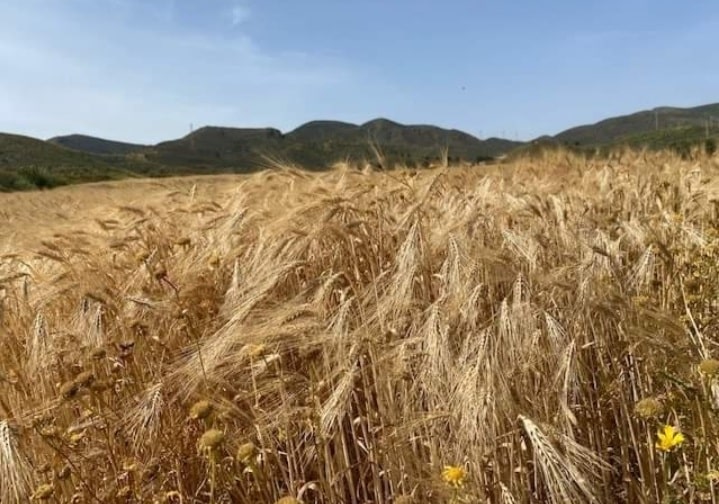- ‘World supplies dented by droughts and transportation blockages, including truck drivers strikes in Spain’
By Andrew Atkinson
Spain has increased the productivity of wheat crops on the midst of a world shortage – due to the ongoing war between the Ukraine and Russia.
Murcian farmers have switched to growing wheat cereal crops this spring, previously used for irrigated crops.
The increased hike in wheat prices is also due to climatic change in other wheat-producing countries.
Fields of wheat have been planted by farmers in Fuente Álamo and Mazarrón, amongst other areas.
In Ukraine, silos are filled with 15 million tons of corn from the autumn harvest – most of which was scheduled for world markets.
Stockpiles, half the corn Ukraine had been expected to export, are increasingly difficult to get to buyers.
Russia’s war against Ukraine has wrought in approximately $120 billion global grains trade, due to supply-chain bottlenecks, skyrocketing freight prices and weather events.
Deliveries from Ukraine and Russia jointly account for approximately a quarter of the world’s grains trade.
Prior to Russia’s attack, Ukraine’s corn made its way to Black Sea ports, including Odesa and Mykolaiv by rail, loaded on to ships for Asia and Europe.
With the ports shuttered, little amounts of corn are transferred westward by rail through Romania and Poland before being shipped out.
“Railways are not supposed to go that way with the grain,” said Kateryna Rybachenko, deputy chair of the Ukrainian Agribusiness Club.
“This makes the whole logistics very expensive and inefficient, and also very slow. Logistically, it’s a big problem,” he said.
Ukraine is one of the world’s biggest exporters of corn, wheat and sunflower oil.
Grains exports are limited to 500,000 tons monthly, a decrease of up to 5 million tons before the war, losing $1.5 billion, said the country’s agriculture ministry.
Russia, the world’s biggest exporter of wheat, pre-war, could be blighted over delivery and payment for future cargoes.
Disruptions in the flows of grains and oilseeds has lead to seeing prices soar – which has lead to other countries, including India, entering into the export market.
Brazil’s exports of wheat in the first three months of 2022 have surpassed those in all of last year, with US corn cargoes heading to Spain for the first time in four years.
Dan Basse, president of AgResource, said: “We can move the deck-chairs around, but if the conflict stretches into the summer, when wheat exports from the Black Sea usually accelerate, then you start running into problems. That’s when the world starts to see shortfalls.”
World supplies have been dented by droughts in Canada and Brazil and transportation blockages in parts of the world, including truck drivers strikes in Spain.
Prices are at a record high, with corn and wheat futures in Chicago increasing by over 20% since the turn of the year.
The United Nations has warned food prices, at an all-time high, could increase by up to 22% or more.
China has increased exports, with a near record 8.5 million tons in the season, which ended in April.
The global grains trade, not including rice, could reduce by 12 million tons this season, the International Grains Council estimated.
Importers are rolling back restrictions to get grain from more origins. Spain, the Ukraine’s No. 2 corn buyer, has relaxed rules on pesticides to allow for feed from Argentina and Brazil.
It also got 145,000 tons from the US in March, its first cargoes since 2018, and China, a major Ukraine corn customer.
The main Brazilian corn harvest is two months away – bad weather in the northern hemisphere could mean curtailed supplies for farmers who feed the grain to hogs and chickens.
Livestock farmers are getting almost no supplies now, from either Russia or Ukraine, due to the naval blockade in the Black Sea, despite efforts being made to source from the Americas.
Pig farmers could be next in line at risk: “These are the things we are trying to manage, how we can change the origin of our product in order to get what we need,” said Miguel Angel Higuera Pascual, director of Spanish pig-farming group Anprogapor.
“This is the situation we have right now, to try to readjust,” he added.
Caption: Wheat fields in Fuente Álamo and Mazarrón. Photo: Zoe Cooper.





